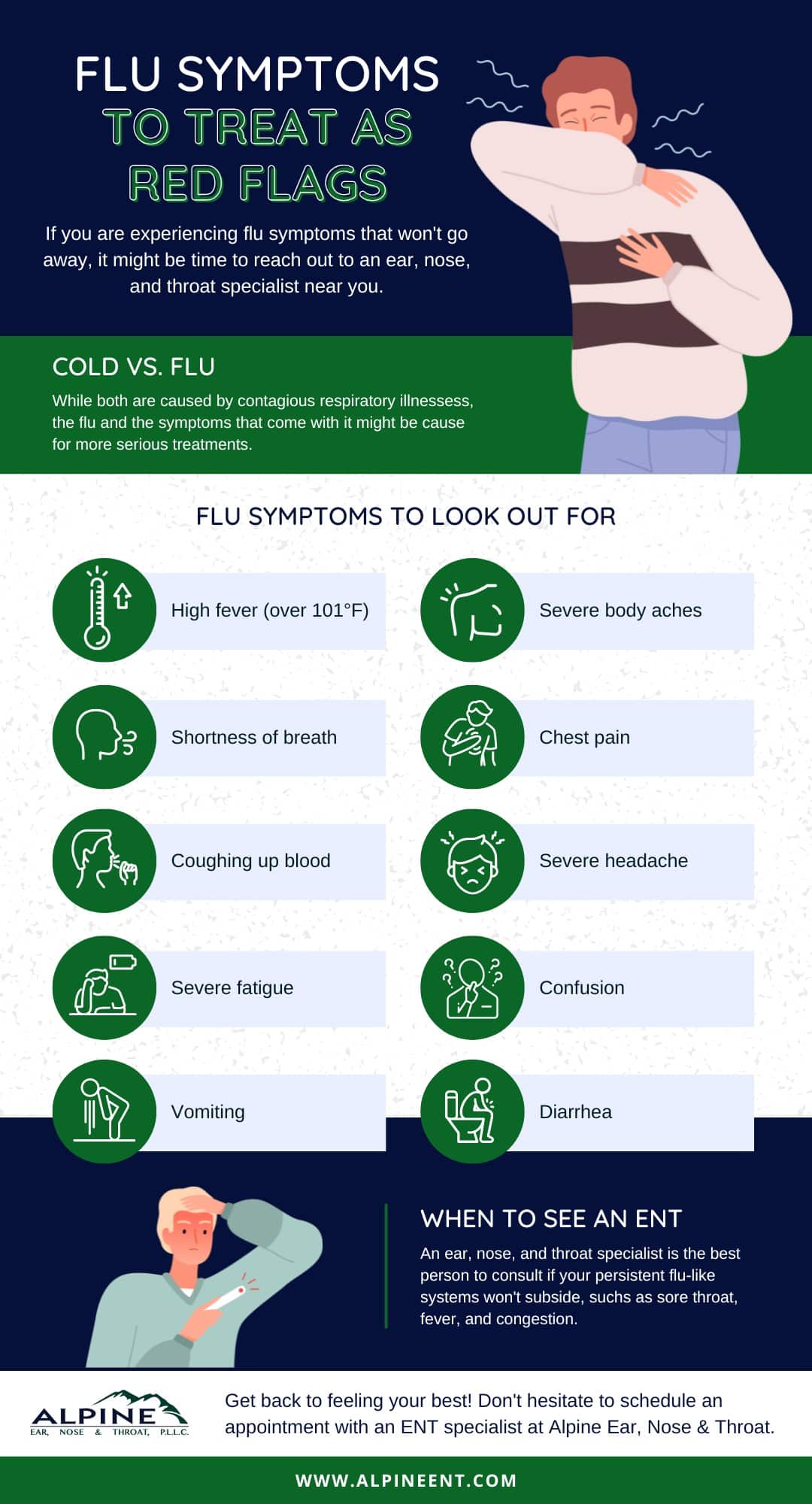
Have you been feeling under the weather lately? Do you think it might be the flu? While influenza can cause a wide range of symptoms, some symptoms should be treated as red flags and warrant a visit to the doctor.
At Alpine Ear, Nose & Throat in Northern Colorado, our physicians are equipped to diagnose and treat illnesses of the ear, nose, and throat. If you are experiencing flu-like symptoms that do not subside, it might be time to visit one of our ENT specialists. Our goal is to provide personalized, knowledgeable care to help you get back to feeling your best. Read on to learn more about the red flags flu season can bring and reach out to our team of ENT specialists for more information on treatment options designed with you in mind.

Cold Vs. Flu
With the flu season beginning in October and lasting through the early spring months of April and May, it can be difficult to differentiate between a cold and the flu.
The common cold and the flu are both contagious respiratory illnesses, but they are caused by different viruses. The flu is caused by the influenza virus and can lead to severe symptoms like fever, body aches, fatigue, and coughing. The common cold, on the other hand, is caused by different types of viruses and usually has milder symptoms, like a runny nose, sore throat, and sneezing.
While both illnesses can be treated with over-the-counter medications and home remedies, the flu can warrant more serious treatments, such as antiviral medication. It is important to seek medical care if you think you may have the flu, especially if you are in an at-risk group such as pregnant women, young children, the elderly, or those with chronic health conditions.
Flu Symptoms to Look Out For
The flu can cause a wide range of symptoms, but some should be treated as red flags. These include
- High fever (over 101°F)
- Severe body aches
- Shortness of breath
- Chest pain
- Coughing up blood
- Severe headache
- Severe fatigue
- Confusion
- Vomiting
- Diarrhea

It’s important to note that the flu is a virus, and antibiotics will not help. The best way to treat the flu is to rest, drink plenty of fluids, and take over-the-counter medications. However, if your symptoms don’t improve after several days or if you experience any of the above symptoms, it’s time to seek medical attention.
When to See an ENT Specialist

If you are experiencing flu-like symptoms that do not subside, it might be time to visit an ENT specialist, also known as an otolaryngologist.
An ENT (ear, nose, and throat) specialist is a doctor who specializes in diagnosing and treating conditions related to the ear, nose, throat, and head and neck area. This includes allergies, sinus infections, hearing loss, voice problems, and more.
An ENT specialist is the best person to consult if you are having persistent flu-like symptoms that are not improving, such as a sore throat, fever, and congestion. They will be able to properly diagnose your condition and provide the necessary treatment.
If you are experiencing any of the following symptoms, it may be time to see an ENT specialist:
- Severe nasal congestion that lasts more than a few days
- Persistent sore throat that does not improve
- Fever that lasts more than a few days
- Earache or hearing loss
- Swelling in the neck
- Persistent coughing or wheezing
- Trouble swallowing or speaking
- Severe headaches
Choose Alpine Ear, Nose, & Throat in Northern Colorado
If you’re experiencing flu-like symptoms that don’t seem to go away, don’t hesitate to reach out to an ENT specialist at Alpine Ear, Nose & Throat in Northern Colorado. Our specialists are committed to providing you with the best care and will work to ensure that you get the right treatment for your specific needs. Contact us today to learn more about how we can help you get back to feeling your best.
Call Alpine Ear, Nose & Throat at for more information or to schedule an appointment.